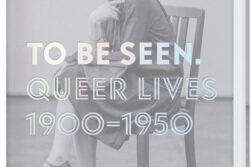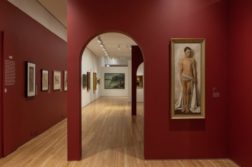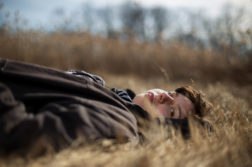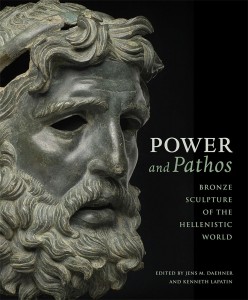 When we think of the ancient Greeks, we think of the body beautiful, particularly the male body, and all those graceful gods and Herculean heroes. But a new exhibit and its accompanying coffee-table catalog (Power and Pathos; Edited by Jens M Daehner and Kenneth Lapatin; J. Paul Getty Museum, $65, 367 pages) present a more complex picture of the human form as represented by the ancients.
When we think of the ancient Greeks, we think of the body beautiful, particularly the male body, and all those graceful gods and Herculean heroes. But a new exhibit and its accompanying coffee-table catalog (Power and Pathos; Edited by Jens M Daehner and Kenneth Lapatin; J. Paul Getty Museum, $65, 367 pages) present a more complex picture of the human form as represented by the ancients.
Power and Pathos tells the story of the Hellenistic Period after Alexander the Great, when Greek culture spread through the known world, bringing with it a greater emphasis on realism in art. Works like the poignant Statue of a Seated Boxer (3rd century BCE, in bronze with copper inlays)—with his wrapped hands and puffy, bruised face—and the charmingly pudgy Statue of Eros Sleeping (3rd century BCE, bronze) are a long way from the absolute perfection of the Apollo Belvedere, which we know as a Roman marble copy of a Greek bronze of roughly Alexander’s time (350-325 BCE).
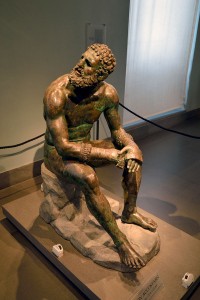
And yet, the story is much more complex than that, for many Greek and Roman artists continued to create works in the stiff, Egyptian-inspired style of archaic times or, on the other hand, in the idealistic classical style of, say, Phidias. Even the more realistic Seated Boxer has a surprisingly smooth, well-muscled body.
The Greeks used bronze, which they thought represented the divine. And yet, bronze actually mimics the texture of human flesh in a way that marble does not.
Clearly, there’s more to the ancient Greeks than meets the aesthetic eye.
Power and Pathos is showing at the J. Paul Getty Museum in Los Angeles through Nov. 1 and at the National Gallery of Art in Washington D.C. Dec. 6 through March 20. For more info, visit getty.edu/museum/ and nga.gov.
Georgette Gouveia is the author of Water Music, and a writer for this magazine. She maintains a blog called thegamesmenplay.com on her musings on sports and culture, including the ancient Greeks.




